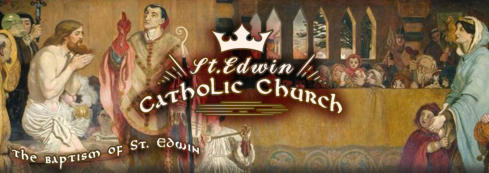Last Rites
Pastoral care of the sick and homebound includes the
sacraments of Reconciliation, Anointing of the Sick (“Extreme
Unction”) and reception of Holy Communion, called viaticum.
Accompanying these three is the Apostolic Pardon, a special
indulgence for those nearing death. Together they are often referred
to as “last rites,” especially for those at the point of death. Note: if
your loved one is in a hospital, the Archdiocese supplies a Catholic
priest chaplain whom you can contact.
Solicitation of Last Rites springs from the desire of a Catholic
afflicted by illness or age to receive these spiritual remedies. The
parish priest, for his part, is then pleased to visit, often remembering
or hearing of the individual’s dedication to Christ over the years and
wanting to make these gifts of grace available at a difficult moment
in life. Such an approach differs from the scenario where family
members hastily seek to impose the anointing upon an unresponsive
individual who never expressed the desire to receive one or all three
sacraments with the indulgence as intended by the Church.
Each one of the above, in its own way, ordinarily presumes a
cogent and responsive recipient. Waiting until a family member is
unconscious or otherwise purely passive makes the reception of the
Last Rites in their integrity impossible.
An appointment for the Last Rites should be made while the
individual is still sufficiently alert and able to respond. Although
emergencies do exist, so often people wait until the last instant,
press the parish priest to visit at a moment’s notice and then shame
him if he can’t immediately drop everything he was doing to rush
over. This should not have to be mentioned, but the practice of all
these together has suffered sufficiently to make some commentary
necessary. “Last Rites” do not mean last minute.
Those caring for the sick or elderly person should make efforts
to prepare that individual for the Sacrament of Reconciliation by
assisting in an “examination of conscience,” so that there is
something to confess. Common faults rise from the challenges of
being confined, weak, ill and in pain, or enduring mental frustration,
irritation and feelings of neglect. Some people are burdened by not
having forgiven another for some old offense. There might be sins of
a more serious nature that have never been confessed. Even past
faults that still cause remorse, though already forgiven, may be
added. You can find one examination here.
While the Sacrament of Reconciliation is private, family and
other loved ones are welcome to be present afterwards for the
anointing, reception of Holy Communion and the Apostolic Pardon.
A little table or other space can be prepared beforehand with a
tablecloth and candles and other sacramentals like a crucifix and
statue to make a place for the Eucharist when the priest arrives.
Beyond that, St. Edwin Parish offers a simple anointing after
the 8:00am Mass on the second Friday of the first month of each
new quarter. You can find the exact dates on our Master Calendar,
here. We welcome visitors who would like to bring a family member
or friend to be anointed. Typically those who receive the sacrament
are 65 and older and/or with some infirmity.
Last Rites, received with care and foresight, provide maximum
consolation and spiritual benefit to the faithful. They constitute one
of the Church’s most special gifts to confort those who are ill, or
remove “the sting of death” to gracefully assist an individual
preparing for that last step into eternity.







Last Rites
Pastoral care of the sick and
homebound includes the
sacraments of Reconciliation,
Anointing of the Sick (“Extreme
Unction”) and reception of Holy
Communion, called viaticum.
Accompanying these three is the
Apostolic Pardon, a special
indulgence for those nearing death.
Together they are often referred to
as “last rites,” especially for those
at the point of death. Note: if your
loved one is in a hospital, the
Archdiocese supplies a Catholic
priest chaplain whom you can
contact.
Solicitation of Last Rites
springs from the desire of a
Catholic afflicted by illness or age
to receive these spiritual remedies.
The parish priest, for his part, is
then pleased to visit, often
remembering or hearing of the
individual’s dedication to Christ
over the years and wanting to make
these gifts of grace available at a
difficult moment in life. Such an
approach differs from the scenario
where family members hastily seek
to impose the anointing upon an
unresponsive individual who never
expressed the desire to receive one
or all three sacraments with the
indulgence as intended by the
Church.
Each one of the above, in its
own way, ordinarily presumes a
cogent and responsive recipient.
Waiting until a family member is
unconscious or otherwise purely
passive makes the reception of the
Last Rites in their integrity
impossible.
An appointment for the Last
Rites should be made while the
individual is still sufficiently alert
and able to respond. Although
emergencies do exist, so often
people wait until the last instant,
press the parish priest to visit at a
moment’s notice and then shame
him if he can’t immediately drop
everything he was doing to rush
over. This should not have to be
mentioned, but the practice of all
these together has suffered
sufficiently to make some
commentary necessary. “Last
Rites” do not mean last minute.
Those caring for the sick or
elderly person should make efforts
to prepare that individual for the
Sacrament of Reconciliation by
assisting in an “examination of
conscience,” so that there is
something to confess. Common
faults rise from the challenges of
being confined, weak, ill and in
pain, or enduring mental
frustration, irritation and feelings
of neglect. Some people are
burdened by not having forgiven
another for some old offense.
There might be sins of a more
serious nature that have never
been confessed. Even past faults
that still cause remorse, though
already forgiven, may be added.
You can find one examination
here.
While the Sacrament of
Reconciliation is private, family
and other loved ones are welcome
to be present afterwards for the
anointing, reception of Holy
Communion and the Apostolic
Pardon. A little table or other
space can be prepared beforehand
with a tablecloth and candles and
other sacramentals like a crucifix
and statue to make a place for the
Eucharist when the priest arrives.
Beyond that, St. Edwin Parish
offers a simple anointing after the
8:00am Mass on the second Friday
of the first month of each new
quarter. You can find the exact
dates on our Master Calendar,
here. We welcome visitors who
would like to bring a family
member or friend to be anointed.
Typically those who receive the
sacrament are 65 and older and/or
with some infirmity.
Last Rites, received with care
and foresight, provide maximum
consolation and spiritual benefit to
the faithful. They constitute one of
the Church’s most special gifts to
confort those who are ill, or
remove “the sting of death” to
gracefully assist an individual
preparing for that last step into
eternity.



